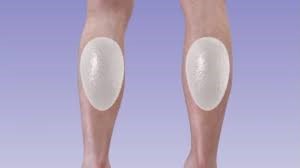
Calf Implant Surgery in Navi Mumbai
Dr. Lukesh Patil offers expert calf implant surgery in Navi Mumbai at Seraphic Aesthetics, enhancing the shape and size of the lower legs. This procedure is ideal for individuals looking to achieve a more balanced and proportionate leg contour. Dr. Patil uses advanced techniques to ensure natural-looking results and a smooth recovery process. With a focus on patient safety and satisfaction, Seraphic Aesthetics provides personalized care and exceptional outcomes for calf augmentation.
Calf implant surgery enhances the size and shape of the lower legs, providing a more balanced and defined contour. Ideal for individuals with underdeveloped calves or those seeking aesthetic improvement, the procedure involves placing silicone implants beneath the calf muscle. This surgery results in natural-looking enhancements, boosting confidence and overall leg appearance. Recovery is typically smooth, with most patients returning to normal activities within a few weeks.
Calf Implant Surgery Cost in Navi Mumbai
Calf implant surgery cost in Navi Mumbai typically ranges between ₹1,50,000 and ₹2,50,000, depending on the treatment plan. This procedure enhances the lower leg's size and shape, offering a more proportionate and defined appearance. The cost usually includes surgeon fees, anesthesia, and hospital charges. Consultation with a qualified surgeon Dr Lukesh Patil will provide a personalized cost estimate based on individual needs and desired outcomes.
| Procedure | Cost Range (INR) |
|---|---|
| Surgeon Fees | ₹80,000 - ₹1,20,000 |
| Anesthesia Fees | ₹20,000 - ₹40,000 |
| Hospital Charges | ₹50,000 - ₹90,000 |
| Pre- and Post-Op Care | ₹10,000 - ₹20,000 |
| Total Estimated Cost | ₹1,50,000 - ₹2,50,000 |
Types of Calf Implant Surgery
- Silicone Implants: This is the most common type of calf augmentation, involving the insertion of solid silicone implants to enhance the calf's shape and size. The implants are available in various sizes and shapes to achieve a natural-looking contour.
- Custom Implants: For patients with unique anatomical needs or specific aesthetic goals, custom implants are designed to fit their exact requirements. This ensures a more tailored and precise result.
- Fat Grafting: This technique involves liposuction to harvest fat from another part of the patient's body, which is then purified and injected into the calves. It provides a more natural augmentation without synthetic implants, although multiple sessions may be needed.
- Combination Procedures: Some patients may benefit from a combination of implants and fat grafting to achieve the desired calf contour. This approach can enhance the overall aesthetic result and provide a more customized outcome.
- Minimally Invasive Procedures: Advances in technology have led to minimally invasive calf augmentation techniques, which involve smaller incisions and reduced recovery times. These procedures can be an option for patients looking for less invasive solutions.
Precautions before Calf Implant Surgery
- Medical Evaluation: Undergo a thorough medical evaluation to ensure you are in good health and a suitable candidate for the surgery. Discuss any medical conditions, allergies, or medications with your surgeon.
- Avoid Certain Medications: Refrain from taking blood-thinning medications, such as aspirin and certain supplements, for a specified period before the surgery as advised by your surgeon.
- Smoking and Alcohol: Stop smoking and limit alcohol consumption several weeks before the surgery, as these can affect healing and increase surgical risks.
- Healthy Lifestyle: Maintain a healthy diet and exercise routine to ensure your body is in optimal condition for the surgery and recovery process.
- Plan Recovery: Arrange for someone to drive you home after the surgery and assist you during the initial recovery period. Prepare your home with necessary supplies for a comfortable recovery.
Precautions after Calf Implant Surgery
- Follow Post-Operative Instructions: Adhere to your surgeon's post-operative care instructions, including wound care, medication regimen, and activity restrictions.
- Rest and Elevation: Keep your legs elevated as much as possible to reduce swelling and promote healing. Avoid strenuous activities and heavy lifting for the recommended period.
- Monitor for Complications: Watch for signs of infection, such as redness, increased pain, or fever. Contact your surgeon immediately if you notice any concerning symptoms.
- Wear Compression Garments: Use any recommended compression garments to help reduce swelling and support the healing process.
- Regular Follow-Ups: Attend all scheduled follow-up appointments with your surgeon to monitor your progress and address any concerns promptly.
FAQs
Q. What is calf implant surgery?
A. Calf implant surgery is a cosmetic procedure that involves placing silicone implants under the calf muscles to enhance the size and shape of the lower legs, creating a more balanced and defined appearance.
Q. Who is an ideal candidate for calf implant surgery?
A. Ideal candidates are individuals with underdeveloped calves or those seeking aesthetic improvement who are in good health, have realistic expectations, and are willing to follow pre- and post-operative care instructions.
Q. What can I expect during the recovery process?
A. Recovery typically involves swelling, bruising, and discomfort for a few weeks. Patients are advised to keep their legs elevated, avoid strenuous activities, and follow their surgeon's care instructions to ensure proper healing.
Q. Are there any risks or complications associated with calf implant surgery?
A. As with any surgical procedure, there are risks, including infection, implant shifting, scarring, and adverse reactions to anesthesia. However, these risks are generally low when performed by an experienced surgeon.
Q. How long do the results of calf implant surgery last?
A. The results of calf implant surgery are typically long-lasting. With proper care and maintaining a healthy lifestyle, patients can enjoy the benefits of enhanced calf contour for many years.
